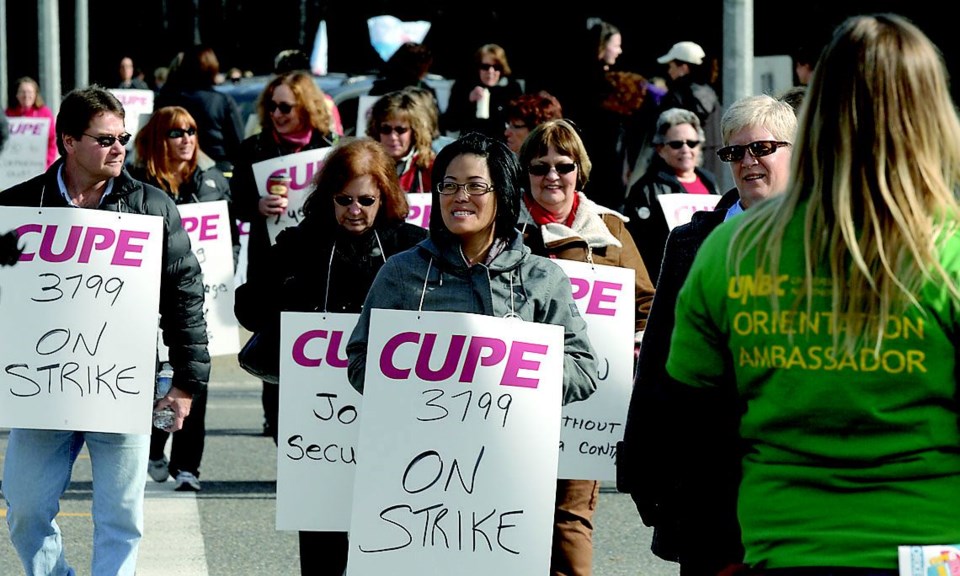Students peppered faculty with questions Tuesday at an information session in advance of a possible Thursday strike at the University of Northern B.C. regional campuses.
The UNBC Faculty Association gave its mandatory 72-hour strike notice early Monday morning.
Much of the answers were vague due to the hypothetical nature of the questions, and their limited ability to disclose details that happen during negotiations.
Faculty association president Jacqueline Holler told the crowd of about 75 students at Canfor Theatre she expects the two sides would negotiate late into the night Wednesday - the first of three scheduled days for negotiations.
Students were mainly concerned about what it would mean for the semester and course assignments.
Third-year history student Deanna Foster would also be without a job because the university pub has already said it would not cross the picket line.
"A lot of students support the faculty. It's frustrating because a lot of students are concerned about their own well being - graduating, convocation, defending your thesis," she said. "I think it's a big financial concern for a lot of students that work at the university."
Holler used other universities as examples. In one case, after a three-week strike, students saw their semester extended by one week. In other examples of five or six weeks of job action, it led to a two-week extension.
"I don't imagine that even in the worst case scenario that we were on strike for three or four weeks, I don't imagine the semester would go into May. Remember that there's another semester starting in May so there's a limit to how much juggling you can do before you start messing with the schedule."
Still, that's a lot of coursework and deadlines to condense in a shortened semester.
Jessy Rajan, president of the Northern British Columbia Graduate Student Society, said graduate students wanting to defend their thesis have a deadline this Friday and those hoping to do field work in the summer must submit to the research board in mid March.
"There are a lot of deadlines right now and we've just come off a two week break, to come out to a strike has been really alarming," said Rajan, noting there has been discussion of extending deadlines.
"But then you're dealing with April deadlines and it's just a domino effect"
She said the strike notice has changed the feeling among students on campus.
"Up until now there was complete complacency, people were not concerned but suddenly it's got really real."
Students at the meeting tried to get a better idea of the gap separating the two, especially after the administration sent out an email to students Tuesday morning with new information about negotiations.
In it John Young, acting provost, wrote the two parties have agreed on 54 articles and that of the 13 remaining items, eight touch on compensation, which both sides agree is the major source of contention.
Young said it offered a five-year agreement that would add $4.5 million to faculty compensation, but that the faculty's proposal added up to an additional $20-million, using the university's "best-cost estimates."
That number doesn't sit quite right with the faculty, which said it also matters how that money is allocated. In particular, faculty are asking for revisions to its salary rubric based on years of teaching.
"We dispute the number $20-million and the university administration would have to commit highly unusual costing measures to come up with that number," said Ted Binnema, chief negotiator for faculty, who later noted the university was including vacant positions in that cost.
Some students were concerned that if the university acquiesced to faculty salary demands that it could result in an increase in tuition. Faculty pointed out that all B.C. post secondary institutions are restricted to a two per cent increase in tuition each year.
Holler encouraged students to speak with each professor about what it would mean for individual assignments, but stressed no work would be accepted during a strike.
Access to services at the cafeteria and residences would not be affected by the strike, faculty said. Some students who lived on campus were concerned about crossing the picket line to access their meals, but Holler said faculty understand and while they will try to engage in conversation, they know it is every Canadians right to cross if they wish.



